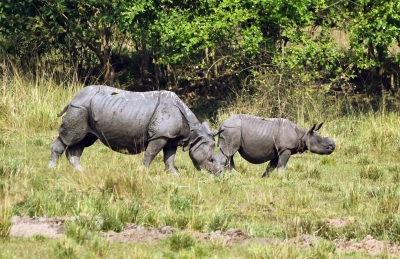
New Delhi, Feb 24 (IANS) Indian researchers have explored how pollen and non-pollen palynomorphs (NPPs) of Kaziranga National Park (KNP) can help in the interpretation of climate in the region.
The KNP in Assam, a corridor for immigration of members of the Indo-Malayan fauna into the Indian sub-region, is a critical reserve for tropical species, having served as a gene reservoir for these taxa during glacial periods.
To understand the effect of climate change on the biodiversity loss in national parks, scientists from the Birbal Sahni Institute of Palaeosciences (BSIP), an autonomous institution of the Department of Science and Technology (DST) developed a modern analogue dataset based on NPPs from different vegetation settings across the KNP.
The study evaluates both the strength and weaknesses of the biotic proxy and assesses how reliably modern pollen and NPP analogue can identify different ecological environments and could be used as a baseline in interpreting Late Quaternary palaeo-environmental and ecological changes more accurately in this region.
Modern pollen analogue being a prerequisite in this high precipitation tropical region for deciphering the past and future climatic scenario, the palaeo-ecological data would assist in better understanding the sustainable future projections in and around the national park.
Compared to single-proxy interpretation, the combination of pollen and NPP can reveal more detailed information and strengthen subsequent palaeo-environmental reconstructions.
The research is the first holistic approach towards developing modern pollen and NPP analogue that would be an accurate reference tool for the past herbivory and ecological studies in the tropical region of northeast India.
The study published in the journal Holocene for the first time helps in identifying marker pollen taxa recovered from surface soil samples in relation to the different vegetation and land-use from KNP.
It could help public and wildlife management agencies to understand the association of flora and fauna, especially herbivores in national parks to conserve it for the current and future prospect, thus informing the National Biodiversity Mission.
–IANS
rvt/rad
Disclaimer
The information contained in this website is for general information purposes only. The information is provided by TodayIndia.news and while we endeavour to keep the information up to date and correct, we make no representations or warranties of any kind, express or implied, about the completeness, accuracy, reliability, suitability or availability with respect to the website or the information, products, services, or related graphics contained on the website for any purpose. Any reliance you place on such information is therefore strictly at your own risk.
In no event will we be liable for any loss or damage including without limitation, indirect or consequential loss or damage, or any loss or damage whatsoever arising from loss of data or profits arising out of, or in connection with, the use of this website.
Through this website you are able to link to other websites which are not under the control of TodayIndia.news We have no control over the nature, content and availability of those sites. The inclusion of any links does not necessarily imply a recommendation or endorse the views expressed within them.
Every effort is made to keep the website up and running smoothly. However, TodayIndia.news takes no responsibility for, and will not be liable for, the website being temporarily unavailable due to technical issues beyond our control.
For any legal details or query please visit original source link given with news or click on Go to Source.
Our translation service aims to offer the most accurate translation possible and we rarely experience any issues with news post. However, as the translation is carried out by third part tool there is a possibility for error to cause the occasional inaccuracy. We therefore require you to accept this disclaimer before confirming any translation news with us.
If you are not willing to accept this disclaimer then we recommend reading news post in its original language.











